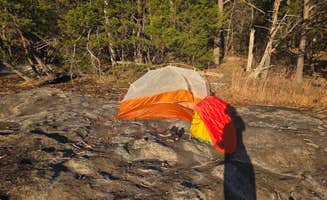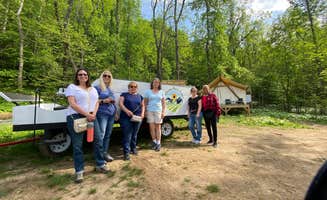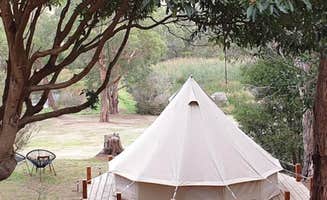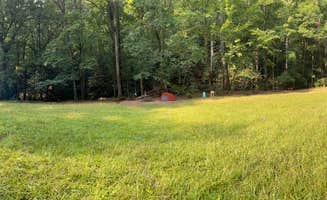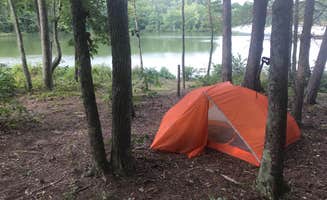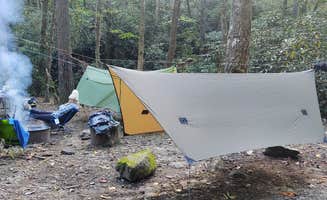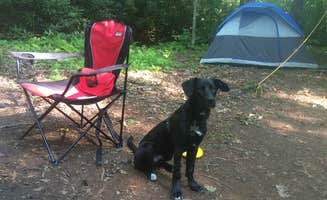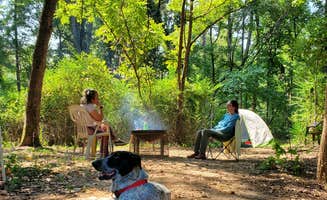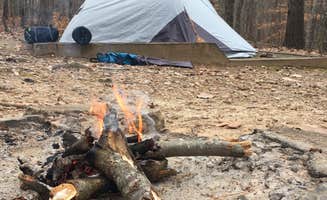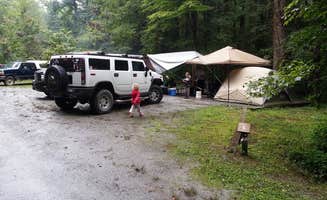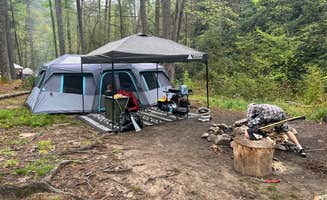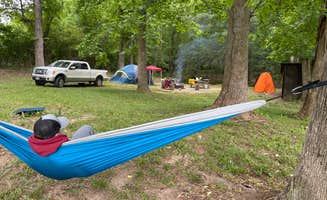Tent camping spots near Claremont, North Carolina offer multiple experiences from remote backcountry sites to riverside camping. Most locations sit between 1,200 and 3,500 feet elevation, creating significant temperature differences between valley and mountain sites. Summer temperatures typically range 10-15 degrees cooler at higher elevations than in Claremont proper, with nighttime temperatures dropping into the 50s even during July and August at many backcountry sites.
What to do
Fishing opportunities: At Lake Curriher Wilderness, campers can access lake fishing directly from remote lakeside sites. "I hike in to the remote campsite on the lake. Lots of fishermen," notes one visitor, mentioning that these more secluded fishing spots require a "decent hike in."
Waterfall exploration: Several campgrounds provide direct waterfall access within short walking distance. At Mortimer Campground, campers can take "a 1/2 mile round trip hike to a waterfall on the property," making it accessible even for families with young children. Another reviewer notes the campground offers "hiking, fishing, swimming, and waterfall splashing" all within the immediate area.
Rock sliding: Near Boone Fork Campground, approximately 35 miles from Claremont, visitors can find natural water slides. "There is an area just 1.5 miles from the Boone Fork Trail parking lot where you can go swimming and sliding off rocks," providing a refreshing summer activity option without requiring additional equipment.
What campers like
Mountain weather: Campers consistently mention the cooler temperatures as a major advantage at sites like Blue Bear Mountain Camp. One reviewer specifically notes the "weather is nice for those trying to escape the summer heat" with temperatures "70-80 in July" at higher elevations, providing relief during hot summer months.
Spacious sites: Many campgrounds in the region offer larger-than-average sites with good separation. At Blue Bear Mountain Camp, "the campsites are very spaced out," and another reviewer confirms "C3 is the best by far" among the camper spots, highlighting the importance of site selection for privacy.
River access: Camping along creeks and rivers ranks as a top feature. "Many of the campsites are situated along Thorps Creek, so the sound of the creek can lull you to sleep," writes a camper about Mortimer Campground, noting their site #6 was directly on the creek, providing both ambient sound and water access.
What you should know
Pack-in requirements: For the best tent camping near Claremont, North Carolina, many sites require carrying gear various distances. At Crowders Mountain State Park Campground, "you must be prepared to pack everything in" as sites require "a one mile hike in to the campground" from the Sparrow Springs access point, according to a reviewer who clarified this entrance provides "the best and easiest way to go."
Limited services: Remote locations mean limited access to supplies. A Mortimer Campground visitor advises being "prepared for zero cell service" and warns the campground is "down a pretty long gravel road, so it's best to have what you need when you arrive. No quick trips to Wally World for resupply here."
Weather challenges: Mountain locations can experience rapid weather changes. "The sites can be a bit difficult to pitch on, due to the abundance of roots, hardpan earth, and slope, but you'll find a spot," notes a camper reviewing backcountry sites at South Mountains State Park, suggesting flexible site selection.
Tips for camping with families
Easy waterfall access: Growing Faith Farms & Retreat provides family-friendly camping close to multiple outdoor attractions. "Plenty of great things to do locally, from hiking and waterfalls to apple picking," notes one family, adding their kids rated it "10k stars" for its combination of private sites and nearby activities.
Kid-friendly trails: When camping with children, select locations with appropriate hiking distances. At Crowders Mountain, "this was a pretty good place to camp... we really enjoyed all of the different hikes and the lake as well as the hike to the top of the mountain," though one parent notes "the hike to the top was a little strenuous for smaller kids."
Accessible fishing spots: Look for campgrounds with easy fishing access for children. Lake Curriher Wilderness offers both cabin and tent options with fishing opportunities right at the campground. A visitor reports catching "a trout in the pond right away" at Blue Bear Mountain Camp, though notes "the hike to the pond was a little more strenuous than we anticipated."
Tips from RVers
Water access limitations: At Self Sufficient Holler, RVers should note the unique water system. "Elizabeth walked us through how to use the pump - easy as pie!" explains one camper about the property's manual water pump system, which requires different procedures than standard campground hookups.
Narrow access roads: Large RVs face challenges on mountain roads to many campgrounds. A Blue Bear Mountain Camp visitor cautions "the state maintained gravel road used to access campground was narrow and would be difficult to get a large camper up there, although there were lots of large ones there," suggesting careful vehicle selection.
Fill tanks before arrival: Many sites lack water hookups but provide fill stations. At Blue Bear Mountain Camp, "they do not have water hookups - you fill your camper tank with water at the office area," notes a regular visitor, adding the campground does offer "spots with electric hookups" and "a dump station where you can empty your tanks on your way out."


